Kris Spisak's Blog, page 28
April 7, 2017
Authors on Editing: Interview with Kristen Green
[image error]
Journalism and non-fiction authors have challenges that fiction writers don’t. This isn’t to say one form is easier than the other—novelists have their fair share of complications to overcome—but there is something stoic about writing down facts and pushing yourself to get it all right. Perhaps even pushing yourself to tell a story that the world needs to hear.
Author Kristen Green once was struck by a story like this, one she knew she had to tell and one we’re all so glad she did. I’m truly honored that she’s joining me to talk about her editing process.
[image error]
Kristen Green is the author of Something Must Be Done About Prince Edward County, published by Harper in 2015 to critical acclaim. The book made the Notable Nonfiction list at the Washington Post, which called it “a gift to a new generation of readers.” Something Must Be Done was selected as an editors’ choice at the New York Times, which deemed it “essential reading.” In 2016, it was the recipient of the Library of Virginia Literary Award for Nonfiction and the People’s Choice Award. Kristen has worked for two decades as a reporter for newspapers including the Boston Globe, the San Diego Union-Tribune, and the Richmond Times-Dispatch. She holds a master’s in public administration from the Harvard Kennedy School. The book, a combination of history and memoir, explores the decision by white leaders of her Virginia hometown to close the public schools rather than desegregate and the role Kristen’s family played. It was the 2016-17 common read at her alma mater, the University of Mary Washington, where she is currently Common Read Writer-in-Residence. She lives in Richmond, Va. with her husband and two daughters.
Q & A with Journalist and Author Kristen Green
Kris: How did lessons learned from your journalism background help the writing and revision process of a full book?
Kristen: I learned the process of writing and revising at the same time as a newspaper reporter. Because much of the work I did as a journalist was on deadline, I often had to report, write, and revise an article in the span of a workday—or even a few hours. In journalism, the writing and editing process is incredibly condensed. It was wonderful training for writing a book and gave me the confidence that I absolutely could produce 80,000 words of copy in 12 to 18 months.
Kris: One thing I’ve loved about talking to so many writers is hearing so many different approaches to editing. When you say you write and revise at the same time, what does this mean specifically? I’d love to hear about this process with Something Must Be Done About Prince Edward County.
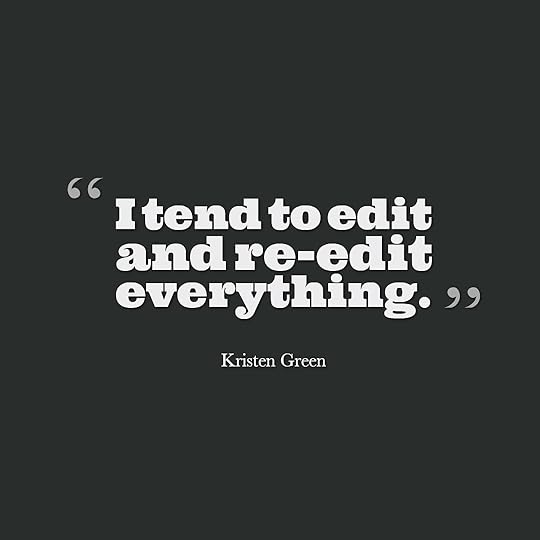 Kristen: I edited as I wrote my first draft of the book, which made the prospect of editing the completed draft a little less overwhelming. I wrote the book in chunks and, after I finished a chunk, I would edit it several times before I joined multiple chunks together to form a chapter. I tend to edit and re-edit everything.
Kristen: I edited as I wrote my first draft of the book, which made the prospect of editing the completed draft a little less overwhelming. I wrote the book in chunks and, after I finished a chunk, I would edit it several times before I joined multiple chunks together to form a chapter. I tend to edit and re-edit everything.
Once I had a final manuscript, I started at the beginning and began revising again. I would mark up a printout of the manuscript, make changes in the Word document on my computer, print out the newly edited manuscript, and start the process over again. I also had friends reading the manuscript, and I was going through their suggestions and making edits based on their suggestions. I read the manuscript aloud and made changes when words or sentences didn’t sound quite right. I revised until I was staring my deadline in the face.
Kris: And all of the different editing techniques you just named—from revising on printed paper as opposed to the computer to having beta readers to reading it aloud—all have unique benefits. I love hearing about the mashup of these practices to push a manuscript to the next level, which clearly was the case with your book. Now, after you began working with your editor on the manuscript, what kind of changes did you make?
Kristen: I’m a person who likes feedback as I report and write, rather than at the end of the writing process. I was this way as a newspaper reporter, too. I always talked to my newspaper editors about expectations for pieces, and if I were working on a long-term project, I would share it with my editor before it was due and request feedback. I was glad my Harper editor was open to seeing drafts of the book. She helped me find my footing as I wove history and memoir together into a hybrid book. I would send a draft to her, wait a few weeks, and she would return it with edits. We went through this process twice before I sent her a final draft of the manuscript.
Kris: Were you surprised by any of her suggestions?
Kristen: She was mostly encouraging, saying that I was doing a perfectly fine job learning how to write a book. Most of her edits were tightening what was already there. Her biggest criticism was that some of my work read like a daily newspaper account, rather than a book. As I moved from the historical part of the book to current day life in my hometown, I was too far in the weeds, she told me, and readers halfway across the country wouldn’t care. Her edits were all on point and made the drafts better.
Kris: Since your writing explores not only the sensitive subject matter of racial politics but also your own family’s history, how did you approach your edits in regards to these complex topics?
Kristen: I have a couple of friends who are particularly well read and experienced in racial politics, and they discussed the book with me as I wrote it, helping me to cover all bases. They also read multiple drafts of the manuscript, suggesting edits and additions. I also read deeply in the subject matter—from the Civil Rights movement to school segregation—and my understanding of the issues made my portrayal of what happened in my hometown richer.
The way I edited my family history wasn’t much different from the way I edited the rest of the book. I fact checked the sections about people in most every case, reading it aloud to the source or emailing text. I gave my parents an opportunity to read the entire book and comment on sections about them and about their parents. Some people challenged how they were portrayed in a particular instance or questioned a fact. Others suggested some sections needed more context. But the reality was that very few changes were requested, and I made even fewer.
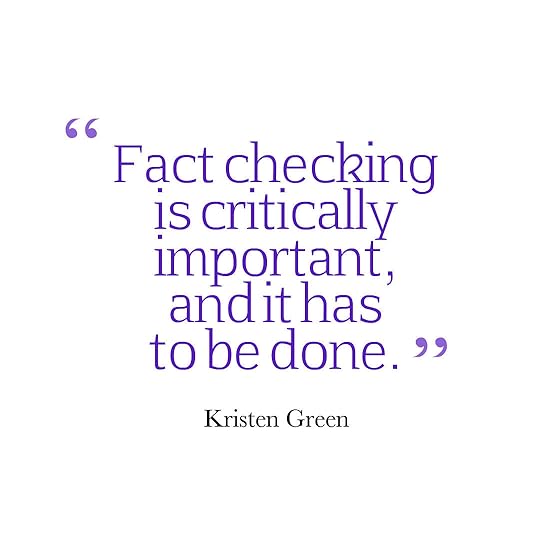 Kris: What did your editing process look like when double-checking your research?
Kris: What did your editing process look like when double-checking your research?
Kristen: It looked messy. I went through the book line by line to make sure that each sentence could be attributed. This was not particularly difficult for the parts of the book based on interviews or the memoir sections. The heavily researched parts were a different matter. I had used many different books as my sources for the section on the five legal cases that made up Brown v. Board of Education. As I fact checked line by line, I went back to each original source to make sure my notations were correct. It was a miserable process that took forever. I was sure there was an easier way to do it, but I didn’t know what that was. Fact checking is critically important, and it has to be done.
Kris: In the end of it all, what do you wish you knew about revision a long time ago?
Kristen: Revision doesn’t have to be an entirely separate process from writing. The two go hand in hand. Maybe for some writers it works best to get a whole draft down on paper so they have something to work with, but that’s not how I work. The way I write and revise—editing as I go—means my completed draft is cleaner than most.
Revision and writing do go hand in hand sometimes, and this process sounds even more appealing with the prospect of finishing a completed draft that is already in good order. Perhaps a bit of journalism training would be good for all of us.
Thank you so much, Kristen Green, for joining me for this interview, and happy writing, everyone!
Join 500+ subscribers and sign-up for my monthly email newsletter for more interviews like this.
The post Authors on Editing: Interview with Kristen Green appeared first on Kris Spisak.
April 6, 2017
Writing Tip 214: “Repellant” vs. “Repellent”


When you start spotting a lot of these guys, do you know what you need?
I want to return to an old conversation about nervous ticks and nervous tics as we discuss the proper spelling of this word. One might have a nervous tic when there are too many insects about, but a tick might be nervous if there is use of repellents.
Yes, I said “repellents”—with an “e.”
But before you confidently walk away from this “repellant” vs. “repellent” conundrum, let’s pause for a moment, because the other spelling isn’t incorrect.
What we have here is a case of preferred spelling versus accepted spelling. Both “repellant” and “repellent” are indeed words. Both have been used for over three hundred years. When I dug a bit deeper and looked into the Google Books Ngram Tool, it was confirmed that “repellent” is and almost always has been the more common spelling, with the exception of a strange outlier moment in history between 1722 and 1727 where “repellant” jumped ahead. What happened in these five years that almost but not quite changed the fate of this spelling, I have no clue.
“Repellent” and “repellant” trace back to the Latin word repellere, meaning to drive back. You can use insect repellent or have repellent behavior. I’d suggest being cautious with both, but at least you can feel confident in your spelling.
Join 500+ subscribers and sign-up for my writing and editing email newsletter for more tips like this.
The post Writing Tip 214: “Repellant” vs. “Repellent” appeared first on Kris Spisak.
April 1, 2017
Authors on Editing: Interview with Léna Roy

As writers, many of us dream of that mentor who will teach us and support us, enabling our writing to enter the next level of professionalism and skill. If you’ve ever had that thought, today’s interview with YA author and biographer Léna Roy might make you jealous. Why? Because Léna Roy’s mentor was her grandmother, Madeleine L’Engle, Author of A Wrinkle in Time.
Now, as a gifted writer and teacher herself, Léna continues this mentoring work with students. I’m overjoyed that she joined me for this interview.

Léna Roy published her first novel, Edges (FSG) in late 2010. She is the Regional Manager for Writopia Lab in Westchester and Connecticut, and her writing was featured in the essay collection for middle school kids and their teachers: Breakfast on Mars and 37 Other Essays to Devour: Your Favorite Authors Take on the Dreaded Essay Assignment. She has written, along with her sister Charlotte Jones Voiklis, a middle grade biography of their grandmother, Madeleine L’Engle to be published by FSG in 2018.
Since 2014, Léna has been recognized by the Scholastic Awards “as an outstanding educator whose dedication, commitment, and guidance are represented by student work selected for national honors.” Mentoring has long been the connective tissue in Léna’s life, whether through her work with at-risk adolescents in Utah, California, and New York—or through her own writing discipline, as fostered by her late grandmother. It was her grandmother who taught Léna to transform the solitary nature of writing into a sacred sense of community, where her art and the art of others can flourish.
Q & A with YA Author and Writing Mentor Léna Roy
Kris: What is the most common misconception about editing that you see in your writing students?
Léna: Oh my goodness. Where do I start? Editing is not just about grammar and mechanics! (That’s its own thing.) First of all, I like to think of editing as revision, so much more fun, don’t you think? I work with kids and teens, so they are used to having to rewrite things, but my goal is to get them to fall in love with revision. You start with a vision, and then once you start writing, maybe the vision changes. Maybe your character does something that seems . . . out of character. But you love it! Then you need to go back to the beginning and add more texture. I want my writers to become grammar nerds too, to see the power it has to help you communicate your thoughts effectively.
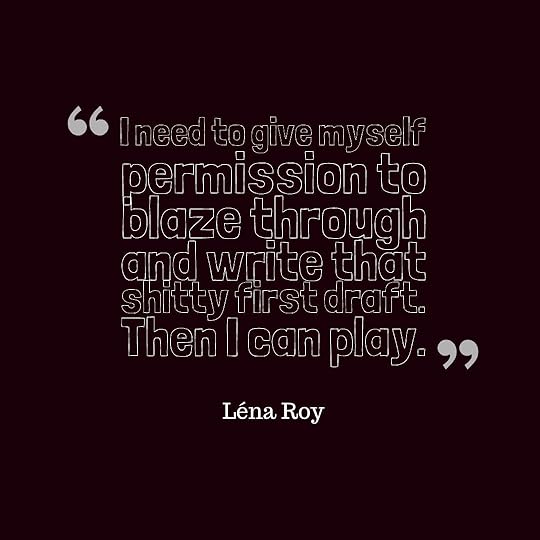 Kris: Tell me about your editing process. Do you edit as you write, or does it all happen at the end?
Kris: Tell me about your editing process. Do you edit as you write, or does it all happen at the end?
Léna: A bit of both. I definitely err on the “pantser” side, otherwise I wouldn’t get anything done. For the few folks who don’t know what I mean, I’ll explain. In writing, we are all on a spectrum between “plotters” on one end and “pantsers” on the other. The plotters have an outline and know what they are going to write. The pantsers write by the seat of their pants, wanting to discover what’s happening as they write. We all need both. I need to give myself permission to blaze through and write that shitty first draft. Then I can play, I can “re-vision,” I can “plot” and see what makes sense. I can add more dimensions and nuanced motions to characters and their responses to what is happening around them.
Kris: Do you have a favorite part of the revision process?
Léna: I love the whole thing! And I love being edited. I love the conversations that can happen.
Kris: What would you argue is the most valuable part of your editing process?
Léna: Seeing the arc of the narrative and being open to killing things (no matter how darling they are) that just don’t work anymore.
Kris: Absolutely. And it can be so hard sometimes, but looking at the whole gives a better picture of what needs to be there and what doesn’t. How does knowing your audience affect how you revise your work?
Léna: I tell anyone in my workshops that they need to write from the heart and not worry about the audience. But when you are writing for school, you have an audience of one—your teacher! So you have to find out what they want to hear and what they like. Editing your work for another teacher, or for the blogosphere, or for children, or adults is very different.
Kris: Do you have a word pair or grammar rule that you wish more people understood?
Léna: This pet peeve has been passed down to me from my grandmother and mother. The word “nauseous” is so misused it’s become (almost) correct. If you are feeling nauseous, that means you are making other people feel sick. If you do indeed have tummy troubles, then you are feeling “nauseated.”
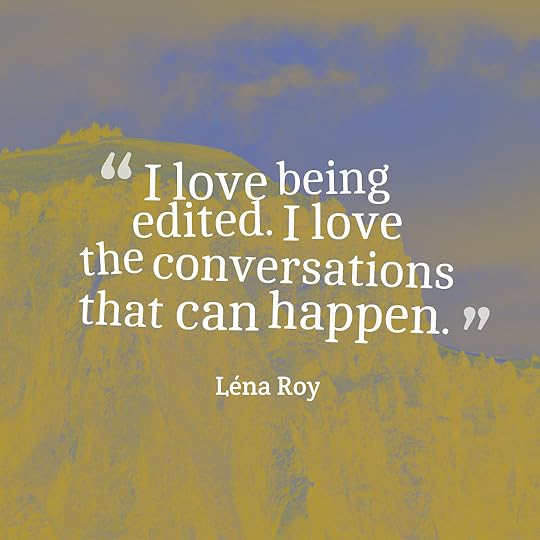 Kris: Oh man, that was one of my favorite tips to add into
Get a Grip on Your Grammar
. So many people don’t seem to realize it! And I’m kind of giddy that Madeleine L’Engle and I have a shared pet peeve! Speaking of your grandmother, I know you’re working with your sister on her biography. How does it change your revision process when you have a partner in crime?
Kris: Oh man, that was one of my favorite tips to add into
Get a Grip on Your Grammar
. So many people don’t seem to realize it! And I’m kind of giddy that Madeleine L’Engle and I have a shared pet peeve! Speaking of your grandmother, I know you’re working with your sister on her biography. How does it change your revision process when you have a partner in crime?
Léna: I loved working on this book with my sister, Charlotte Jones Voiklis! We very much thought of the audience (10 and up) while we were revising. It really helped us kill our darlings!
Kris: The wisdom learned from your grandmother about the writing process was probably invaluable. Did you have any take-aways from her on editing specifically?
Léna: She always had my grandfather read her work and give her feedback, which was invaluable. She taught me the beauty of layering dimensions in revising—giving time for the characters become more real.
Kris: That’s a wonderful answer. It’s such an important piece of the process. And last question: where’s your favorite place to pick up a book that doesn’t need any editing?
Léna: I actually love going to my local library!
I like that answer. Local bookstores and local libraries are great places to find mentors on the other side of things—the reading side. And reading mentors can teach us so much, suggesting the perfect books to put in our hands and cultivating our imaginations.
There were so many good thoughts here. Personally, I have a craving to dive back into some editing work now. Anyone else?
Thank you so much, Léna Roy, and happy writing, everyone!
Join 500+ subscribers and sign-up for my monthly email newsletter for more interviews like this.
The post Authors on Editing: Interview with Léna Roy appeared first on Kris Spisak.
March 30, 2017
Writing Tip 213: “Shore Up” vs. “Sure up”

I just might be catching you using a phrase that doesn’t actually exist with this one. Think fast. Which one is correct? “Shore up” or “sure up”?

Psst… here’s your hint
When a plan at work needs some extra strategic support, when your offensive line has some major gaps, or when your sandcastle is falling down, what do you need to do?
I almost hate to break it to you, but:
the correct phrase is “shore up” not “sure up.”
This expression first appeared a long, long time ago—somewhere between 1300-1500—when the word “shore” was not only a place where the land met the sea or the place where she sells seashells. “Shore” had and has another definition that has fallen out of favor: a support beam, prop, or buttress. This word comes from the Middle Low German schore. Interestingly, this root is different from “shore” as in seashore, which comes from the Middle Low German schor. Confusing? Absolutely, but that’s not the issue at stake here.
The mistake of writing “sure up” instead of “shore up” is common. You find it in news articles, books, and almost anywhere written text is found. And there’s a logic there even. You want to make something “sure” as in certain or unfailing. I hear you, but it just isn’t so.
Sure, “sure” might have logic, but since when has logic stopped the English language? “Sure up” is the syntactic impostor.
Don’t believe me? Maybe it will help that Merriam Webster, Oxford Dictionaries, and Dictionary.com all don’t recognize “sure up” as an existing phrase. It’s true. Feel free to fact-check this one for yourself.
Happy writing, everyone!
Join 500+ subscribers and sign-up for my writing and editing email newsletter for more tips like this.
The post Writing Tip 213: “Shore Up” vs. “Sure up” appeared first on Kris Spisak.
March 28, 2017
Trivia: The Origin of “Boycott”
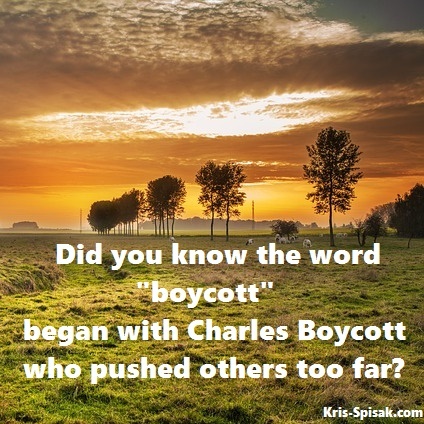
In the fall of 1880, the Irish Land League was working to help tenant farmers better their conditions during the Irish Land War. Here’s where the Englishman, Captain Charles Boycott, enters the scene. He was one of many land agents in this time who was targeted by a non-violent strategy of public ostracism. Not only did his laborers leave his fields, but reportedly, shops would not sell to him, nor would his mail be delivered. All of his supplied had to be shipped from England, because no Irishman would deal with him.
Only a few months after the boycotting of Boycott, his name was first used as a verb. And the rest is history…
Join 500+ subscribers and sign-up for my monthly email newsletter for more trivia like this.
The post Trivia: The Origin of “Boycott” appeared first on Kris Spisak.
March 25, 2017
Authors on Editing: Interview with Kristin Swenson
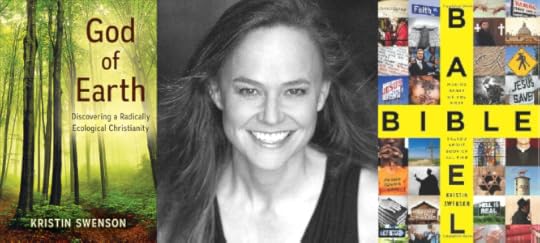
When you are making a first impression, the standard advice is to avoid discussing politics and religion. But what if this is precisely your subject matter and your first impression is your book?
Writing about sensitive issues invites curiosity, but it can also invite arguments and displeasure. What is a writer to do? How do these concerns impact the editing process? Well, I thought these were good questions, and who better to answer them than author and religious studies professor Kristin Swenson.
Kristin Swenson, Ph.D. is associate professor of religious studies at Virginia Commonwealth University (affiliate) and a fellow at the Virginia Foundation for the Humanities in Charlottesville, where she writes full-time. Swenson’s work has appeared in The Christian Century, Publishers Weekly, and The Huffington Post among other publications. An award-winning author, her books include God of Earth: Discovering a Radically Ecological Christianity, Bible Babel: Making Sense of the Most Talked about Book of All Time, and Living through Pain: Psalms and the Search for Wholeness.
Q & A with Author Kristin Swenson
Kris: Religion is a tricky subject. Are there any sensitivities you consider when you revise your finished drafts?
Kristin: I figure I’m going to piss off a whole cadre of people. This is not easy for me to accept but necessary. I’d never write anything otherwise. So then the barometer is myself, my own integrity. I stick by it fiercely. For example, I avoid gender-specific language for God (“He” ugh). We’re talking about God, after all…
Kris: So speaking of examples like God, what is your best advice for writers who are tackling complicated subject-matter but want to do so with absolute clarity?
Kristin: Write for one person, one real, live, non-specialist person… that you love. Imagine sitting down over coffee, or, shoot, a banana split (we’re imagining, right?). You want them to understand what’s been preoccupying you so much (your “complicated subject-matter”). You also want to eat your banana split before it totally melts. A real, particular person won’t put up with high-handed jargon and fluffy generalizations. You know this, so you won’t give them that. And if you love them, you’ll do your darndest to get the idea across in as few words as possible. What’s more, you’ll do it with respect, making it about them not you.
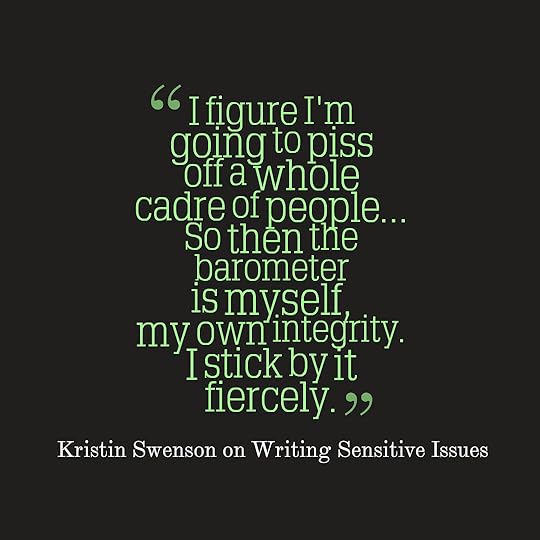 Kris: That’s such wonderful advice, because it is so easy to get tangled up in the jargon of your studies. How do you know you have found the right entry-point for a book (or a chapter or an article). In other words, how do you know if you’ve begun in the right place?
Kris: That’s such wonderful advice, because it is so easy to get tangled up in the jargon of your studies. How do you know you have found the right entry-point for a book (or a chapter or an article). In other words, how do you know if you’ve begun in the right place?
Kristin: Sometimes that opening lands like a bolt and is the very thing that gets me started down a particular writing road. In such a case, it can carry me a good long way. What joy that is! Usually, I don’t know. I jump in wherever the subject gets interesting to me, figuring I’ll provide whatever lead info I need later. Or I think I’ve got my beginning until I finish and then I start the thing all over again.
Kris: How do you know when your editing process is finished and the project is done?
Kristin: If only! I don’t. Deadlines wrest it from my sweaty little fingertips. Or I get totally preoccupied with something new and let the old slip into its next life. I don’t like to read what I’ve already published–it makes me nervous–so I tend to move on as fast as I can.
Kris: Since we are talking editing, what is your favorite grammar rule or often-confused word choice distinction?
Kristin: Further vs. farther. I can get all existential over it.
Kris: You’re speaking to my heart on that one. This pair was actually the very first entry I wrote on my weekly writing tips blog back in 2012, and that same entry is now in a new form in Get a Grip on Your Grammar . So side note, we need to discuss this further (not farther) over drinks, but I have one last question. When you want to take a break from drafting and crafting, what’s your favorite local bookstore to drop by?
Kristin: Gosh, I’m such a consignment/thrift-store gal, ever looking for ways to repurpose old stuff, so “used” is like catnip to me. Chop Suey in Richmond–love love love those guys! Daedelus in Charlottesville (you need a compass to find your way out…).
Needing a compass to find your way out is a great description for an awesome bookstore, and it’s just as apt a metaphor for the editing process, isn’t it? We can get lost in our own language, tangled in a concept or plot point, and adrift among commas that should or shouldn’t be there. But with some help, we all find our way out eventually–even when our subject matter has extra levels of complication to it.
Thanks so much, Kristin Swenson, for your time and wisdom, and happy writing, everyone!
Join 500+ subscribers and sign-up for my monthly email newsletter for more interviews like this.
The post Authors on Editing: Interview with Kristin Swenson appeared first on Kris Spisak.
March 21, 2017
Trivia: Disaster in the Stars
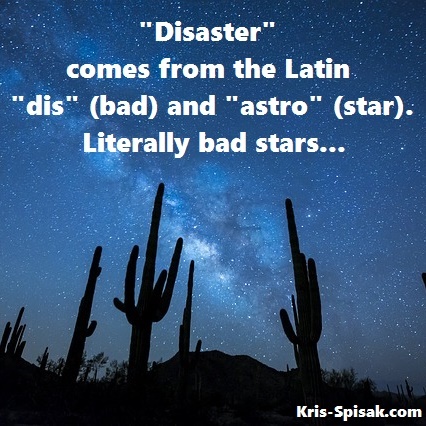
Join 500+ subscribers and sign-up for my monthly email newsletter for more language trivia like this.
The post Trivia: Disaster in the Stars appeared first on Kris Spisak.
March 18, 2017
Authors on Editing: Interview with Gigi Amateau
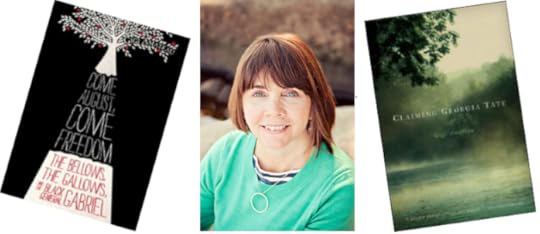
There’s a sense of serenity in Gigi Amateau’s writing that is hard to put your finger on. She tackles subject-matter that’s sometimes simple and sweet and other times multifaceted and brutal without a flinch, without hesitation, and with a lyricism to her prose that makes you want to sit under the shade of a leafy tree in the summertime and just soak it all in.
Having the chance to talk with Gigi about how her stories come to be and the editing that fine-tunes them gives me immense pleasure.
Gigi Amateau‘s first book for young adults, Claiming Georgia Tate, was published by Candlewick Press in 2005. The Wall Street Journal called the book “an ambitious push into the young adult market.” She is also the author of A Certain Strain of Peculiar, a Bank Street College Best Children’s Book of the Year and Chancey of the Maury River, A William Allen White Masters list title for grades 3-5. In 2012, Gigi received a Theresa Pollak Prize for Excellence in the Arts.
Come August, Come Freedom, her first work of historical fiction, was selected as a Bank Street College Best Children’s Book of the Year, a 2013 Jefferson Cup honor book, and the Library of Virginia’s 2013 People’s Choice Fiction Award. In 2015, Candlewick published Two for Joy and Dante of the Maury River.
Gigi earned a Bachelor of Science degree in urban studies and planning from Virginia Commonwealth University (VCU) and has worked in the health and human services sector for nearly thirty years. She is a certified yoga instructor (RYT 200) and is currently pursuing a Master of Science in Gerontology at VCU. She lives with her family in the city of Richmond.
Q & A with Author Gigi Amateau
Kris: When it comes to that time for rolling up your sleeves and diving into your work, what is the most fun part of the process for you?
Gigi: I live for that moment when everything comes together in my mind: the fog lifts, and I understand how the path can unfold. Also, I could research for light years and still want more.
Kris: What do you think is the most important thing for a writer to know about the editing process?
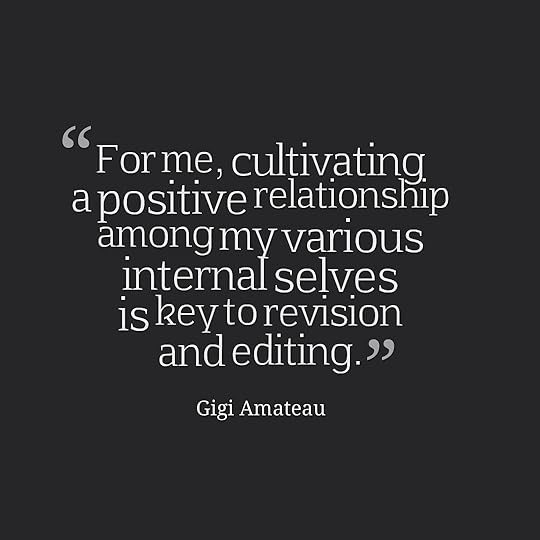 Gigi: For me, cultivating a positive relationship among my various internal selves is key to revision and editing. Everyone may not segment their writing process into distinctly different parts; that works for me.
Gigi: For me, cultivating a positive relationship among my various internal selves is key to revision and editing. Everyone may not segment their writing process into distinctly different parts; that works for me.
In the beginning of a new work, I ask my internal editor to stay on the sidelines, observing and listening, while my wilder and freer writer goes up the mountain or out to the islands—wherever the story lives. A friendly and trusting internal editor knows that if she’s going to have something to work with, she must support and encourage that initial expedition, which ultimately makes her job easier. I love my internal editor!
Kris: Thinking of your writer mind as having unique selves within it is fascinating. I can see how it could be easier to break down the process that way. Different tasks need different skill-sets, and who likes someone hovering over their shoulder? I like that. So how have you found that your internal selves do their best work?
Gigi: Fairly consistently, my process involves free writing a longhand first draft, revising directly into Scrivener, reading out loud, and revising on a hard copy. Repeat all or portions. And lots of research, always.
Kris: I know a lot of writers who use that hand-written to digital transcription time as revising time. And reading aloud is always great advice. Are there any red flags for you when something needs to be reworked or perhaps cut entirely?
Gigi: When I observe myself taking off my glasses and setting a manuscript down at the same spot over and over—repetitive drift-off syndrome. It’s a major clue.
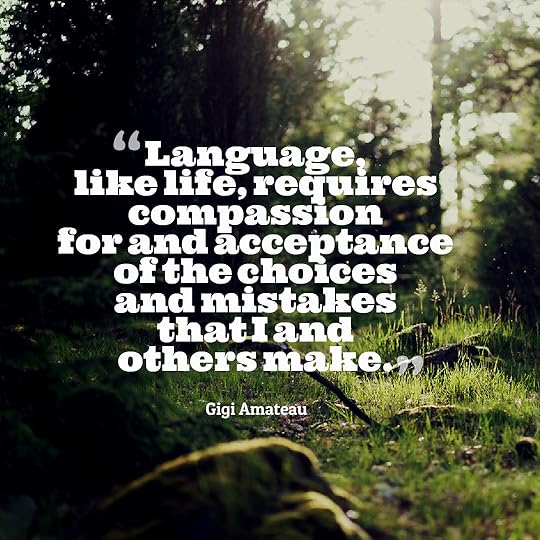 Kris: Right, because if the story’s not holding you, the author, in that moment, it won’t hold the reader either! Great advice. What about punctuation or word usage issues. Are there any that you often have to remind yourself of along the way?
Kris: Right, because if the story’s not holding you, the author, in that moment, it won’t hold the reader either! Great advice. What about punctuation or word usage issues. Are there any that you often have to remind yourself of along the way?
Gigi: Oh, I’d say commas, in general. I think I’m getting better as I get older!
Kris: Commas. So many writers have a love-hate relationship with commas. Any parting words about editing or grammar pet peeves?
Gigi: Language, like life, requires compassion for and acceptance of the choices and mistakes that I and others make.
What a fabulous place to end. We need to be kind to ourselves as we revise our own work, and we need to be respectful of others in their communications. There’s integrity in both acts, isn’t there?
Thank you so much, Gigi Amateau, for discussing your revision process with me, and happy editing everyone!
Join 500+ subscribers and sign-up for my monthly email newsletter for more interviews like this.
The post Authors on Editing: Interview with Gigi Amateau appeared first on Kris Spisak.
March 16, 2017
Writing Tip 212: “St. Paddy’s Day” vs. “St. Patty’s Day”


A four-leaf clover won’t help your cause with this one.
You’ve got to ask yourself, “do I feel lucky?” Well, do ya, punk?
This is what I feel like saying every St. Patrick’s Day when people toss about bad wording among drunken Irishman (and drunken pretend Irishman too).
Before someone irate corrects you on this one, let me be clear: if you’re going to abbreviate St. Patrick’s Day, the correct form is St. Paddy’s Day.
Sure, I hear what you’re saying that you know a Patricia who goes by “Patty” or a Patrick that goes by “Pat.” That shortened version of “St. Patrick’s Day” with a double “t” might make more sense at first glance. But common sense isn’t what’s being discussed here. There’s a language barrier you aren’t considering.
Yes, I said language barrier.
Remember that the Irish do indeed speak English, but Gaelic was the original language of the island, a language still found tucked away in modern day communities. And in Gaelic, “Paddy” is the abbreviation of “Pádraig” or “Patrick” as we would say in English.
From the Dublin airport to your local bar, you will find many more than willing to correct you on this holiday faux pas. And depending on the person, the luck of the Irish may or may not be on your side.
Join 500+ subscribers and sign-up for my writing and editing email newsletter for more tips like this.
The post Writing Tip 212: “St. Paddy’s Day” vs. “St. Patty’s Day” appeared first on Kris Spisak.
March 14, 2017
Trivia: The Longest Place Name


Now how one pronounces it, I have no idea.
“Taumatawhakatangihangakoauauotamateaturipukakapikimaungahoronukupokaiwhenuakitanatahu” is a hill in New Zealand, and its name apparently translates to “The summit where Tamatea, the man with the big knees, the slider, climber of mountains, the land-swallower who travelled about, played his nose flute to his loved one.” (Disclaimer: I haven’t been able to verify this Māori translation. If anyone is a speaker/reader of Māori, let me know!)
Next time you feel like your street name or hometown is hard to spell, hopefully this will make you feel better!
Sign up today to join 500+ subscribers to my monthly newsletter for more writing trivia like this.
The post appeared first on Kris Spisak.



